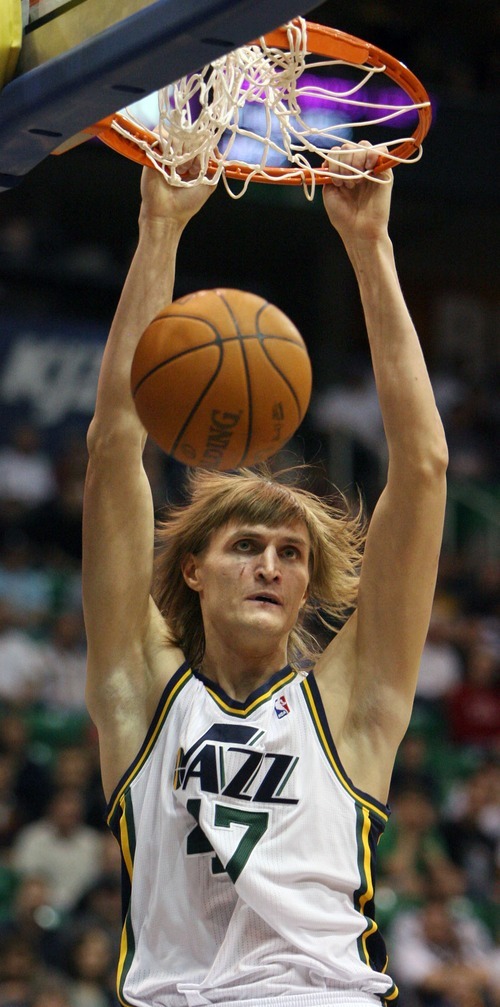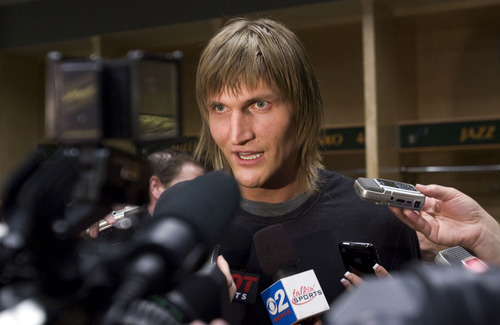This is an archived article that was published on sltrib.com in 2011, and information in the article may be outdated. It is provided only for personal research purposes and may not be reprinted.
Trying to describe the extremes of the Jazz's season, Andrei Kirilenko searched for a creative illustration.
"How you call the animal with stripes?" he asked.
Kirilenko explained his zebra comparison by citing the contrasting halves of the schedule.
In assessing Kirilenko's career, nothing is ever completely black-and-white with this guy. He's some mixture of the dynamic, exciting player who was awarded the Jazz's first maximum contract and the inconsistent, often-injured forward whose salary crippled the franchise.
So as Kirilenko and the Jazz determine whether to extend their 10-year relationship, here's my solution: A.K. should play for free.
Seriously, how refreshing would that be?
Asked about his free-agent priorities, Kirilenko said, "I'm definitely not going to look for the money. I think I've got enough."
The National Basketball Players Association probably would not endorse pro bono work. But what if Kirilenko signed with the Jazz for $1.4 million, a 10-year veteran's minimum salary? That would further endear him to fans who so easily forgive him for missing games at a rate approaching Carlos Boozer's, and, in essence, pay back some of the $86 million the Jazz largely wasted on him these past six seasons.
That contract made sense for the Jazz when Kirilenko signed it in October 2004. At the time, with Boozer and Mehmet Okur having just arrived in town and Deron Williams in college, Kirilenko looked like the Jazz's only All-Star for years to come.
By the deal's expiration, of course, it had gone beyond ridiculous. In the final two seasons of the contract, Kirilenko averaged 11.8 points and 4.8 rebounds, missed 42 regular-season games and participated in exactly zero playoff-game victories, being sidelined for last spring's Denver series. For that contribution, he received $34.2 million — and cost the team even more, via the NBA's luxury tax.
"Look, we're the ones that gave him the contract," said general manager Kevin O'Connor. "Everyone looks at the contract and looks at the production, and I don't think that's fair to him. That's on us a little bit. But I'm comfortable that we would like to have him back."
All that's unfair is Kirilenko kept cashing checks for roughly $200,000 per game. So he owes the Jazz and their fans something. A lot, actually.
Anyone would be intrigued about free agency, and Kirilenko will be marketable, even if he acknowledged his injury-prone nature, saying, "Teams should count on that."
Kirilenko said New Jersey is "very interesting," with Russian billionaire Mikhail Prokhorov as the owner and Williams as the point guard. But his family is established here and he belongs with the Jazz, helping them rebuild with a greatly reduced salary that makes the operation functional.
The Jazz are "definitely my first choice," Kirilenko said the day after the season ended, three weeks since he last appeared in a game. "So many good memories here. Ten years, you don't want to throw it out so quick."
Kirilenko revealed a conversation he once had with the late Larry H. Miller, offering to void the contract by telling the Jazz owner, "You can take the money back."
Miller honored the deal, which we now know was a mistake.
This is Kirilenko's chance to right that wrong.
As he stood in the Jazz's locker room Thursday, possibly for the last time, Kirilenko described the team's supportive fans as "way different than fans in Russia. ... This is worth a lot, I'm telling you."
How much, exactly? The Jazz have invested so much in Kirilenko that, whenever the negotiating period begins, they should try to keep him, in the continuing hope of a reasonable return. He should respond in kind.
This organization once gave Kirilenko the maximum, and now he should play for the minimum.





